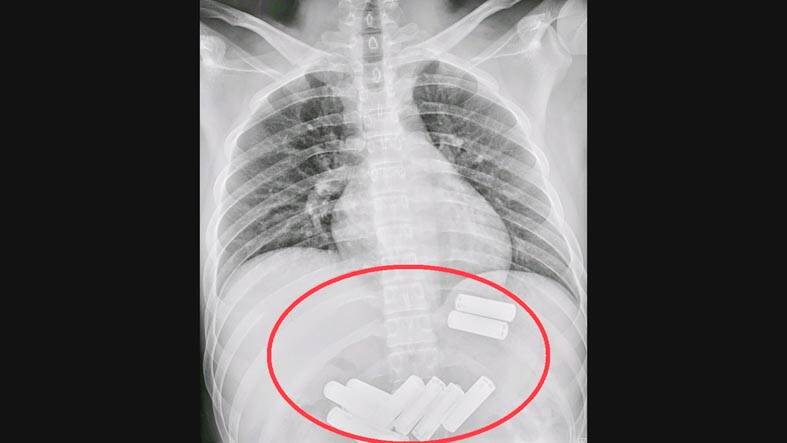Doctors earlier this week removed 11 batteries from a man’s stomach, intervening before they posed a serious danger to his health.
The 23-year-old man surnamed Lee (李) was taken to Da Chien General Hospital in Miaoli County late at night by a friend who said that Lee had swallowed batteries, gastroenterologist Lin Te-fu (林德福) said yesterday.
From an X-ray, doctors confirmed the presence of 11 AA batteries in Lee’s stomach, he said.

Photo courtesy of Da Chien General Hospital via CNA
When conducting a gastroscopy, using an endoscope to examine the upper digestive tract, they also discovered a lot of food among the batteries, he added.
As there is a risk of ulceration or tearing the stomach lining with endoscopic foreign body retrieval, in addition to being painful in the throat, doctors took their time with the procedure, Lin said.
They ended up spending about an hour carefully removing each battery, avoiding the need to perform surgery and taking them out before they posed a greater risk to the man’s health, he said.
After experiencing the pain of removing 11 batteries from his stomach, Lee told the doctors that he “would not dare” do it again, Lin said.
Mostly it is children who come into the hospital after swallowing foreign objects, with alcohol poisoning a far more common malady among adults, he said.
Some foreign objects could tear the esophagus if ingested, such as sharp objects, magnets, aluminum trays used for medication, fish bones and chicken bones, Lin said.
If a bone is accidentally ingested, Lin recommended first visiting an ear, nose and throat doctor to see whether it had become lodged in the oropharynx.
If the object has moved past the esophagus, a gastroenterologist must perform an endoscopy to remove it after locating it on an X-ray and determining it is safe, he said.
Not every accidental ingestion requires emergency intervention, Lin said, adding that objects smaller than 2cm usually pass on their own after four to six days.
However, if the item obstructs the esophagus, or if it is a battery, sharp or long, he recommended seeking immediate medical help.
Doctors also advised particular care for young children, the elderly and those with chronic difficulty swallowing, as items can become stuck more easily.

Taiwan is to commence mass production of the Tien Kung (天弓, “Sky Bow”) III, IV and V missiles by the second quarter of this year if the legislature approves the government’s NT$1.25 trillion (US$39.78 billion) special defense budget, an official said yesterday. Commenting on condition of anonymity, a defense official with knowledge of the matter said that the advanced systems are expected to provide crucial capabilities against ballistic and cruise missiles for the proposed “T-Dome,” an advanced, multi-layered air defense network. The Tien Kung III is an air defense missile with a maximum interception altitude of 35km. The Tien Kung IV and V

The disruption of 941 flights in and out of Taiwan due to China’s large-scale military exercises was no accident, but rather the result of a “quasi-blockade” used to simulate creating the air and sea routes needed for an amphibious landing, a military expert said. The disruptions occurred on Tuesday and lasted about 10 hours as China conducted live-fire drills in the Taiwan Strait. The Civil Aviation Administration (CAA) said the exercises affected 857 international flights and 84 domestic flights, affecting more than 100,000 travelers. Su Tzu-yun (蘇紫雲), a research fellow at the government-sponsored Institute for National Defense and Security Research, said the air

Taiwan lacks effective and cost-efficient armaments to intercept rockets, making the planned “T-Dome” interception system necessary, two experts said on Tuesday. The concerns were raised after China’s military fired two waves of rockets during live-fire drills around Taiwan on Tuesday, part of two-day exercises code-named “Justice Mission 2025.” The first wave involved 17 rockets launched at 9am from Pingtan in China’s Fujian Province, according to Lieutenant General Hsieh Jih-sheng (謝日升) of the Office of the Deputy Chief of the General Staff for Intelligence at the Ministry of National Defense. Those rockets landed 70 nautical miles (129.6km) northeast of Keelung without flying over Taiwan,

A strong continental cold air mass is to bring pollutants to Taiwan from tomorrow, the Ministry of Environment said today, as it issued an “orange” air quality alert for most of the country. All of Taiwan except for Hualien and Taitung counties is to be under an “orange” air quality alert tomorrow, indicating air quality that is unhealthy for sensitive groups. In China, areas from Shandong to Shanghai have been enveloped in haze since Saturday, the ministry said in a news release. Yesterday, hourly concentrations of PM2.5 in these areas ranged from 65 to 160 micrograms per cubic meter (mg/m³), and pollutants were